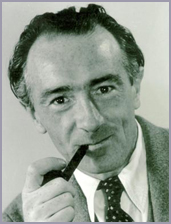Archibald Cochrane, MD, CBE, FRCP, FFCM
1909 — 1988

“Archie” Cochrane was a Scotsman educated at Kings College, Cambridge. Due to an interesting personal condition he sought psychoanalysis and followed his analyst to Berlin, Vienna, and the Hague, eventually throwing over analysis for medical school at University College Hospital, London. He served with the International Brigade in the Spanish Civil War.
In World War II he was taken prisoner in Crete by the Germans and served as a medical officer in POW camps for several years in Greece and Germany. He spent 1947-48 at the Phipps Institute in Philadelphia studying tuberculosis and then became member of the Medical Research Council Pneumoconiosis Unit in Wales from 1948-1960, after which he directed the MRC Epidemiology Unit in Cardiff until 1974.
His fame relates mainly to a small book published in 1972 on health services (see below), but he was a pioneer in both cohort studies and randomized trials and contributed largely to the development of the science of epidemiology. He carried out long term studies of risk characteristics in mining cohorts in the Rhondda Fach in Wales, where he trained two notable CVD epidemiologists, Ian Higgins and William Miall.
Cochrane proposed that randomized clinical trials, and later, their systematic review, were the more reliable evidence sources for evaluation of medical care. His recommendations and influence led to the posthumous founding of the Cochrane Collaboration in his honor, a center specializing in systematic reviews or meta-analyses among international data from clinical trials.
Sources
Higgins, IT and Cochrane, AL. Chronic respiratory disease in a random sample of men and women in the Rhondda Fach in 1958. British Journal of Industrial Medicine, 18 (1958): 93-102.
Cochrane, AL. Effectiveness and Efficiency. Random Reflections on Health Services. London: Nuffield Provincial Hospitals Trust, 1972.